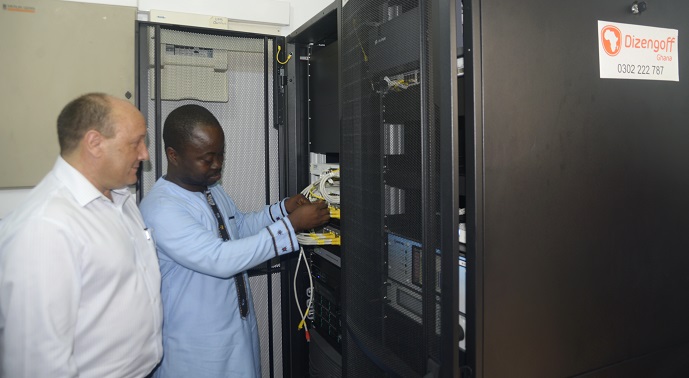
Satellite hub to bridge rural-urban divide launched
The Ghana Investment Fund for Electronic Communications (GIFEC) has launched a satellite hub which targets universal access to telecommunication services for remote communities in the country.
Advertisement
Known as the VSAT Satellite Hub, the system, which has the capacity to connect 2,000 communities nationwide, will, among other functions, provide a satellite communication service that delivers a terrestrial-grade experience with voice, video and data.
Already, 100 rural communities have been connected to the system and more are expected to be added by the end of January 2017 as part of GIFEC’s Rural Telephony Project.
Cost
The project was undertaken by Dizengoff Ghana Limited and the satellite hub cost GH¢37 million, covering the cost of operation and maintenance for two years, as well as the provision of 100 Internet sites and 25 Real-Time Transport Protocol (RTP).
The RTP is an Internet protocol standard that specifies a way for programmes to manage the real-time transmission of multimedia data.
A Deputy Minister of Communications, Mr Felix Kwakye-Ofosu, who launched the system in Accra yesterday, said it was a major step towards bridging the rural-urban digital divide.
With Ghana’s mobile penetration said to be 127. 63 per cent, which equals 35 million voice subscribers and 18.03 million or 65.74 per cent of data subscribers as of December last year, according to National Communications Authority (NCA) figures, Mr Kwakye-Ofosu said the information and communications technology (ICT) sector was key to the country’s development.
Second fibre optic cable
In May last year, the government inaugurated the Eastern Corridor Fibre Optic Backbone to increase access to a high-speed Internet broadband.
Mr Kwakye-Ofosu said another fibre optic cable in the western corridor was in the pipeline to serve the country’s nascent oil and gas industry.
The Administrator of GIFEC, Mr Kwabena Owusu Akyeampong, observed that the construction of the satellite hub would reduce recurrent cost in providing Internet services to more than 300 community information centres, senior high schools and rural telephony sites.
He said the project had the capacity of 2,000 Internet points and run on a self-financing sustainability model.
With hackers boldly attacking the website and electronic transmission of some of the country’s state institutions, including the Electoral Commission, the Ministry of Justice and Attorney-General, the Information Services Department (ISD), the General Manager of Communications at Dizengoff Ghana, Mr Patrick Attia, said the system had firewalls to prevent hacking and other forms of interference.
The Principal Programmnes Manager of GIFEC, Mr Michael Agyei Takyi, for his part, said the system would have a control at the National Information Technology Agency that would closely monitor it to deal with any challenge that might arise.




